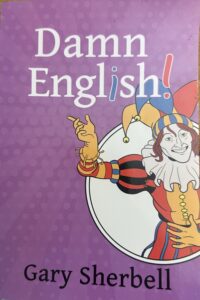Reviewed by Linda C. Brinson
DAMN ENGLISH! By Gary Sherbell. Black Rose Writing. 131 pages. $15.95, paperback.
 If you are a writing and word nerd, or if clever humor and good laughs would lift your spirits, you’ll probably enjoy spending time with Gary Sherbell’s new book, Damn English!
If you are a writing and word nerd, or if clever humor and good laughs would lift your spirits, you’ll probably enjoy spending time with Gary Sherbell’s new book, Damn English!
Sherbell, a New Yorker who has also written novels, plays and screenplays, has put the language he now damns to good use over the years. But in this book, he has plenty of legitimate (and humorous) observations and complaints about how confusing and sometimes ludicrous this hodgepodge mother tongue of ours can be.
Damn English! is far from an academic tome on the proper use of the English language. Nor is it a guidebook for those wanting to write grammatically and clearly (something that seems to be valued less than it should be in these days of thumb typing, emojis and text messages that use letters in place of words). I have, and highly value, a shelf full of such reference works, within reach of my right hand as I type this review.
But I’ll make room for Sherbell’s book too, because it is clever, amusing and often right on point. Let’s face it: English is confusing and sometimes nonsensical, for those of us who grew up speaking it as well as for those brave souls who learn it as a second language.
Sherbell enjoys pointing out and poking fun at the bewildering words that are spelled similarly but pronounced quite differently, confusing homonyms and heteronyms, irregular verbs, words with multiple and sometimes contradictory meanings, and so on. He has fun with the plethora of words and phrases that mean the same thing – or do they, really, after he examines then, perhaps too literally? And then there are the words that have – shhhh! – “dirty” connotations as well as their more socially acceptable meanings.
He takes familiar figures of speech, cliches and phrases that we use unthinkingly and proceeds to dissect and ponder them until he has us laughing.
Much of what Sherbell gives us is satirical or tongue-in-cheek, amusing and also sometimes thought provoking, in a light-hearted sort of way.
I must admit that as a career writer and (worse!) editor, I started marking a few minor grammatical and punctuation errors as I read. But as soon as I underlined his incorrect use of the non-word “alot,” what did I find but a parenthetical note that pages to come would include his ”dissertation on the proper spelling of ‘a lot.’ …?”
At that, I gave up and let myself relax and laugh a bit. Or should I say a tad?